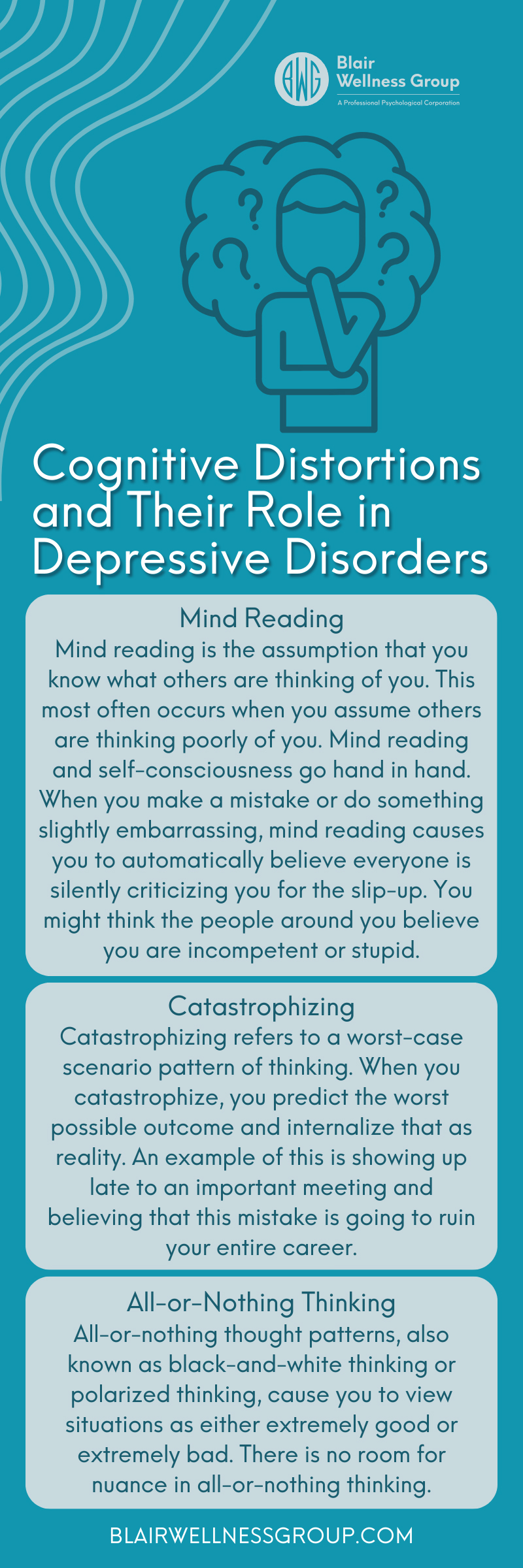One of the biggest challenges of Depressive Disorders is the negative thoughts you have about yourself and your place in the world. Depressive Disorders can make you believe that you are worthless or somehow a burden. They can make you think you have no place in the world and there is no hope for your future. These negative thought patterns go on to exacerbate other symptoms, such as feelings of guilt, isolation from others, and even suicidal thinking.
If you want to heal from these symptoms, you need to treat the negative thought patterns at their source. These thought patterns, known as cognitive distortions, influence the way your mind works, which means they affect your emotions, behaviors, and your view of yourself and the world around you. Read on to learn more about cognitive distortions, their role in Depressive Disorders, and how professional intervention and treatment from a Licensed Clinical Psychologist can help.
What Are Cognitive Distortions?
Cognitive distortions refer to anomalies in your thought patterns that cause you to see yourself and reality in an unhealthy and inaccurate way. The way you think influences your behavior, your ability to handle emotions, and the way you react to different situations. Healthy thought patterns allow you to handle negative feelings and experiences in a productive way. These negative experiences do not influence your self-worth or your view of reality.
With cognitive distortions, however, you struggle to process negative experiences in a healthy manner and fall prey to harmful and inaccurate patterns of thinking.
Cognitive Distortions and Depressive Disorders
Everyone can experience cognitive distortions, but they are more common in individuals with Mental Health Disorders. In the case of Depressive Disorders, cognitive distortions are what fuel negative thoughts about yourself. For example, with maladaptive thought patterns, making a simple mistake at work can lead to you seeing yourself as a failure. This feeds into the feelings of guilt, shame, and worthlessness that are common symptoms of Depressive Disorders.
There are many different types of negative thought patterns. Below are a few examples of common cognitive distortions associated with Depressive Disorders.
Mind Reading
Mind reading is the assumption that you know what others are thinking of you. This most often occurs when you assume others are thinking poorly of you. Mind reading and self-consciousness go hand in hand. When you make a mistake or do something slightly embarrassing, mind reading causes you to automatically believe everyone is silently criticizing you for the slip-up. You might think the people around you believe you are incompetent or stupid.
Mind reading can also occur on a more personal scale, such as thinking a friend or partner is angry at you because they have not texted you in a while. These thoughts cause you to fixate on your flaws and believe that everyone around you is doing the same. The result is an increase in embarrassment, shame, guilt, and other negative feelings associated with Depressive Disorders.
Catastrophizing
Catastrophizing refers to a worst-case scenario pattern of thinking. When you catastrophize, you predict the worst possible outcome and internalize that as reality. An example of this is showing up late to an important meeting and believing that this mistake is going to ruin your entire career.
Even if there are consequences to your mistake, those consequences are not going to ruin your life. However, catastrophizing causes you to exacerbate the issue in your own mind, often leading to unfair thoughts about your own worth.
All-or-Nothing Thinking
All-or-nothing thought patterns, also known as black-and-white thinking or polarized thinking, cause you to view situations as either extremely good or extremely bad. There is no room for nuance in all-or-nothing thinking.
This creates rigid, exaggerated thinking that often punishes you for being anything less than perfect. For example, if you skip a workout or miss your monthly goals at work, you view yourself as a total failure. This can cause you to give up on your goals because you believe that one off day means everything has fallen apart.
Emotional Reasoning
Just because your emotions are real does not mean they are always rational. With emotional reasoning, however, you often base your decisions and behaviors on how you feel rather than facts or reality. Emotional responses do not give you an objective view of the world. For example, feeling lonely does not mean you are completely alone. Feeling worthless does not mean that people around you do not value you.
Emotional reasoning is one of the many ways Depression lies to you, making it one of the most dangerous cognitive distortions to have a role in Depressive Disorders.
Labeling
Labeling occurs when you make assumptions about someone, then go on to let those labels define your view of that person. These labels are often based in knee-jerk reactions, emotional responses, overgeneralizations, or other cognitive distortions, and they lead to inaccurate and unfair views of reality.
It is important to note that you can label yourself in this way, too. By responding to a negative situation with a negative label—such as calling yourself weak or inadequate—you lower your view of yourself and harm your own self-esteem.
Personalization
Personalization means taking things personally even when they have nothing to do with you. This maladaptive thought pattern can cause you to shoulder blame and guilt as if a situation is entirely your fault—even if it is completely out of your hands. When your first reaction to a negative situation is to blame yourself, you exacerbate feelings of guilt, shame, and worthlessness. This creates an unhealthy view of yourself and worsens the effects of Depressive Disorders.
The Dangers of Distorted Thinking
The struggle with cognitive distortions is not just that you experience these negative thoughts and reactions. One of the biggest dangers is that you cannot clearly identify these maladaptive thought patterns for what they are. Instead, you accept them as reality. This creates a downward spiral as your thoughts and behaviors grow increasingly negative and create a darker, more unhealthy view of yourself and the world around you.
Because of this, cognitive distortions make life seem less worthwhile. Without professional treatment, they lead to dangerous symptoms such as emotional numbness, self-isolation, and even self-destructive behaviors such as self-harm or thoughts of suicide.
Treating Cognitive Distortions With CBT
Cognitive Behavioral Therapy (CBT) is a form of evidence-based therapy that revolves around identifying and bringing attention to cognitive distortions. Through Cognitive Behavioral Therapy with a Licensed Clinical Psychologists, patients learn that these maladaptive thought patterns do not accurately reflect reality or their own self-worth. Through methods such as guided discovery, self-talk, problem-solving skills, and mindfulness, patients restructure cognitive distortions, replacing them with healthier, more productive patterns of thinking.
If you are looking for a Licensed Clinical Psychologist who specializes in CBT in Beverly Hills, Irvine, Newport Beach, Bel Air, Century City, Brentwood, Westwood, Huntington Beach, Mission Viejo, Aliso Viejo, and the surrounding areas, contact Blair Wellness Group. Book an appointment today to see how our evidence-based treatment plans can help you.















